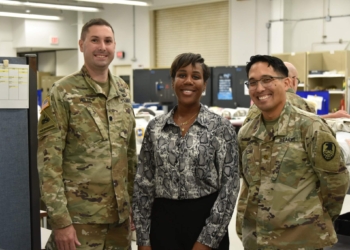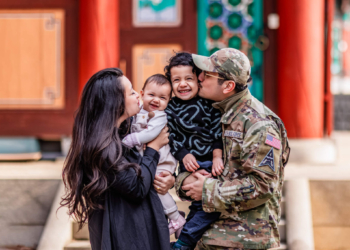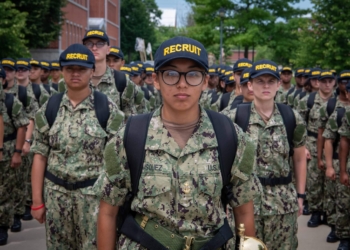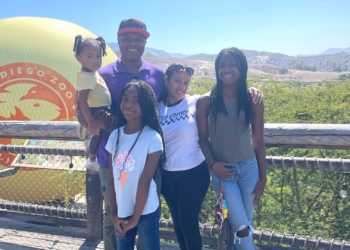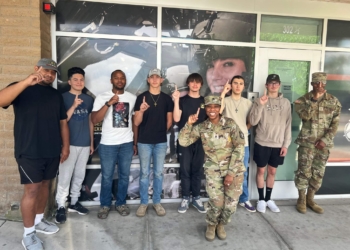A decade ago, then-President Barack Obama signed legislation to repeal “don’t ask, don’t tell” — a Defense Department policy that barred lesbian and gay military members from serving openly. The 17-year ban would remain in place until it was officially lifted in September 2011.
Chief Petty Officer Michelle Roberts enlisted in the Coast Guard in 2002, following her father into the service. She was supposed to go in the year before but when she went for ASVAB testing in 2001, she couldn’t get on base. The reason? It was September 11 and the nation was under attack.
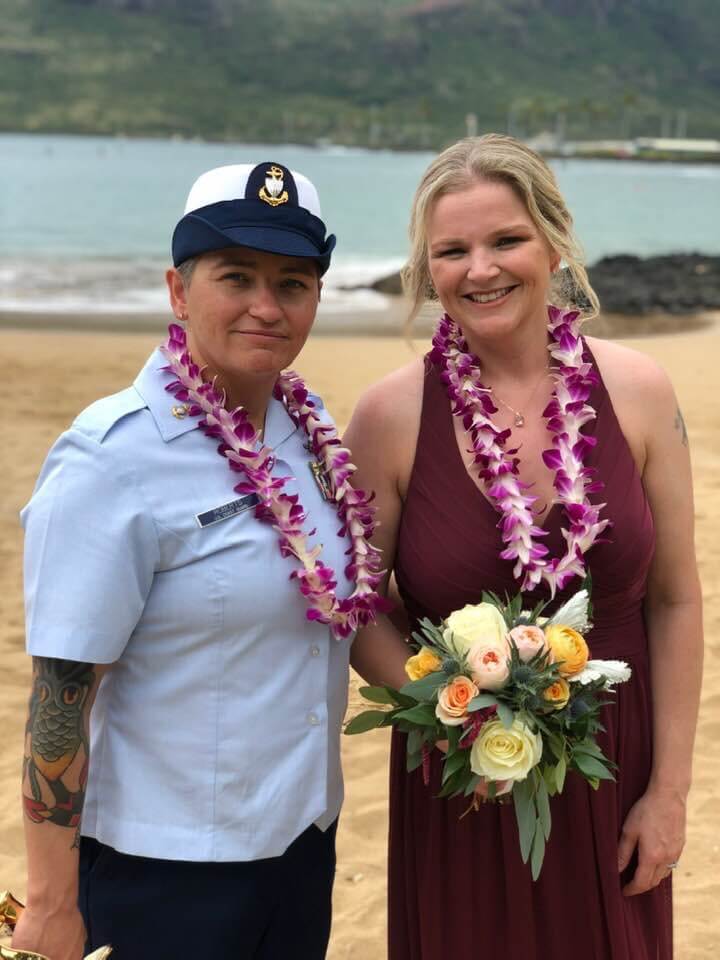
Roberts eventually made it to basic training and went on to become a Machinery Technician. Worrying about DADT wasn’t even on her radar, since she had only dated men up until that point. But then she met a fellow coastie named Calli and everything changed.
“She quickly became my best friend,” Roberts said.
Initially, they both struggled with their relationship because neither had identified as gay before. There was also a lot of deep fear gripping them over whether they’d be discovered.
By 2005 Roberts found herself in a leadership role, which she describes as very stressful.
“On top of the stress at work, I would come home and we were not allowed to go and just be together. We couldn’t talk about our stuff to our families or friends. Every day was a struggle because it all had to be internalized. … There were times I would think that if I didn’t make it home, it wouldn’t be so bad,” Roberts said, fighting through emotion.
Although Calli would eventually get out of the Coast Guard, in part because of DADT, Roberts stayed in — intending to make it a lifelong career. She said that people around her thought DADT was no big deal, if everyone just kept their lives private it was fine.
“But when people saw me, they could say ‘I think.’ They didn’t need any evidence or have to go to court, they could simply say they think they saw me holding hands with someone or kiss someone. That’s it, my career is done,” Roberts said.
When Obama was inaugurated, hope seemed to bloom for the first time.
The couple was stationed in Florida in 2009, and the housing market crash left them stuck in a home they couldn’t sell or afford any longer. Roberts volunteered to deploy to Bahrain to buy them more time.
“I was barely eating over there because everything I was making, I was sending home,” she said. “Overseas it was really tough because I couldn’t talk about her. When I would go up to talk to her on the phone, she was my ‘sister’ or my ‘friend.’”
They endured the yearlong deployment without support on either end.
Then, a year later on Dec. 22, 2010, Obama signed legislation that would set the repeal of DADT in motion.
“The weight that I didn’t realize was there, was lifted,” Roberts said.
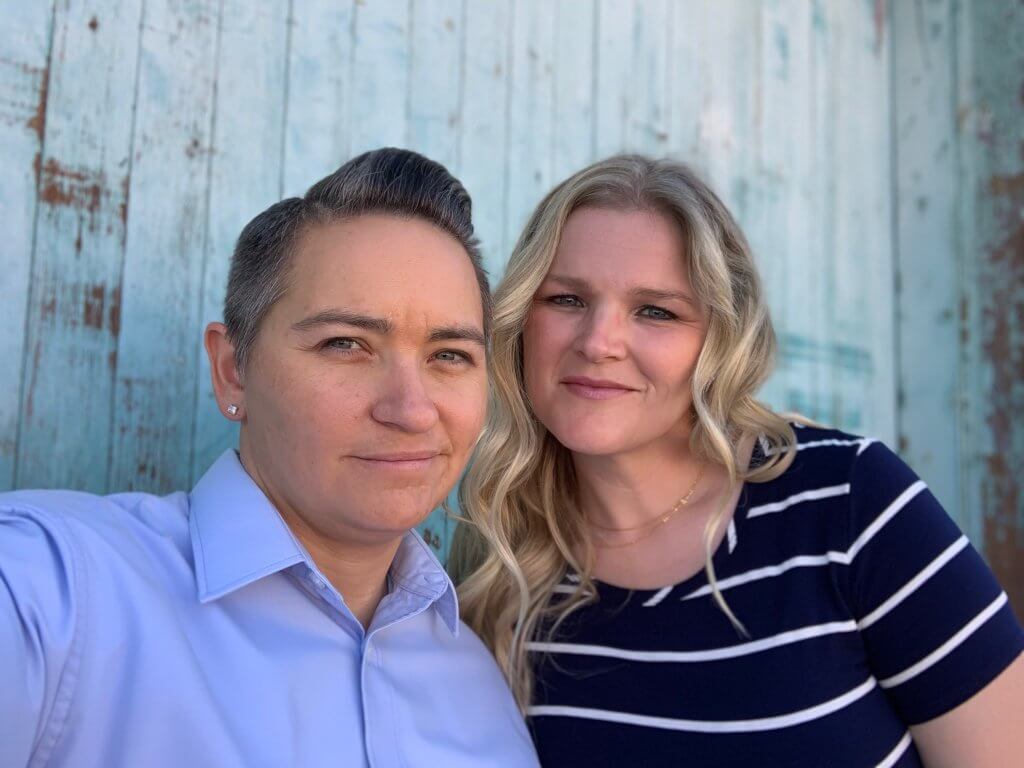
She and Calli had miraculously maintained their relationship in secret for eight years under the order, with almost no support. It was a season that would change their lives forever.
In 2015, the Supreme Court struck down the ban on same-sex marriages, recognizing that it was a fundamental right guaranteed to all. It was a joyful time for Roberts and Calli.
“I thought, man now I am going to have to marry this lady,” she said with a laugh. Roberts shared that she had yet to tell her unit she was gay but was soon going to be inviting them to her wedding. To her shock and surprise, they were all elated for her and everyone came to celebrate their union. These were moments of impact, shedding that fear she carried for so long.
Despite the monumental changes that have taken place since the DADT repeal and legalization of same-sex marriage, the negative impacts of the ban remain.
“I think I still have PTSD from don’t ask, don’t tell,” Calli shared. “We aren’t very affectionate in public … I still to this day feel like I have these scars from hiding for so many years and being forced into a closet.”
Roberts also takes the temperature of the unit every time they PCS before she shares that she has a wife. It’s an effect from DADT that probably won’t ever go away.
Although they may have lingering invisible scars — both recognize that they are lucky too, sharing that their marriage is strong and that the storm they weathered built a closeness that can withstand almost anything. The couple has taken the lessons learned from their struggles to mentor other young same-sex or heterosexual couples on resiliency and the importance of communication.
Roberts said she is grateful to Coast Guard leadership for continued support and to the countless advocates who fought for her and others like her, adding it’s hard to imagine that it’s been 10 years since she had to stop worrying about being open about who she loved. And watching the ongoing efforts on behalf of others still facing discrimination today, leaves her hopeful for the future.
When asked what she’d want people to take away from her story, she smiled.
“People fought for me because I couldn’t fight for me,” Roberts explained. “There are people out there who can’t ask for help but they need it. That’s what everyone’s voice should be for.”
Read comments
















